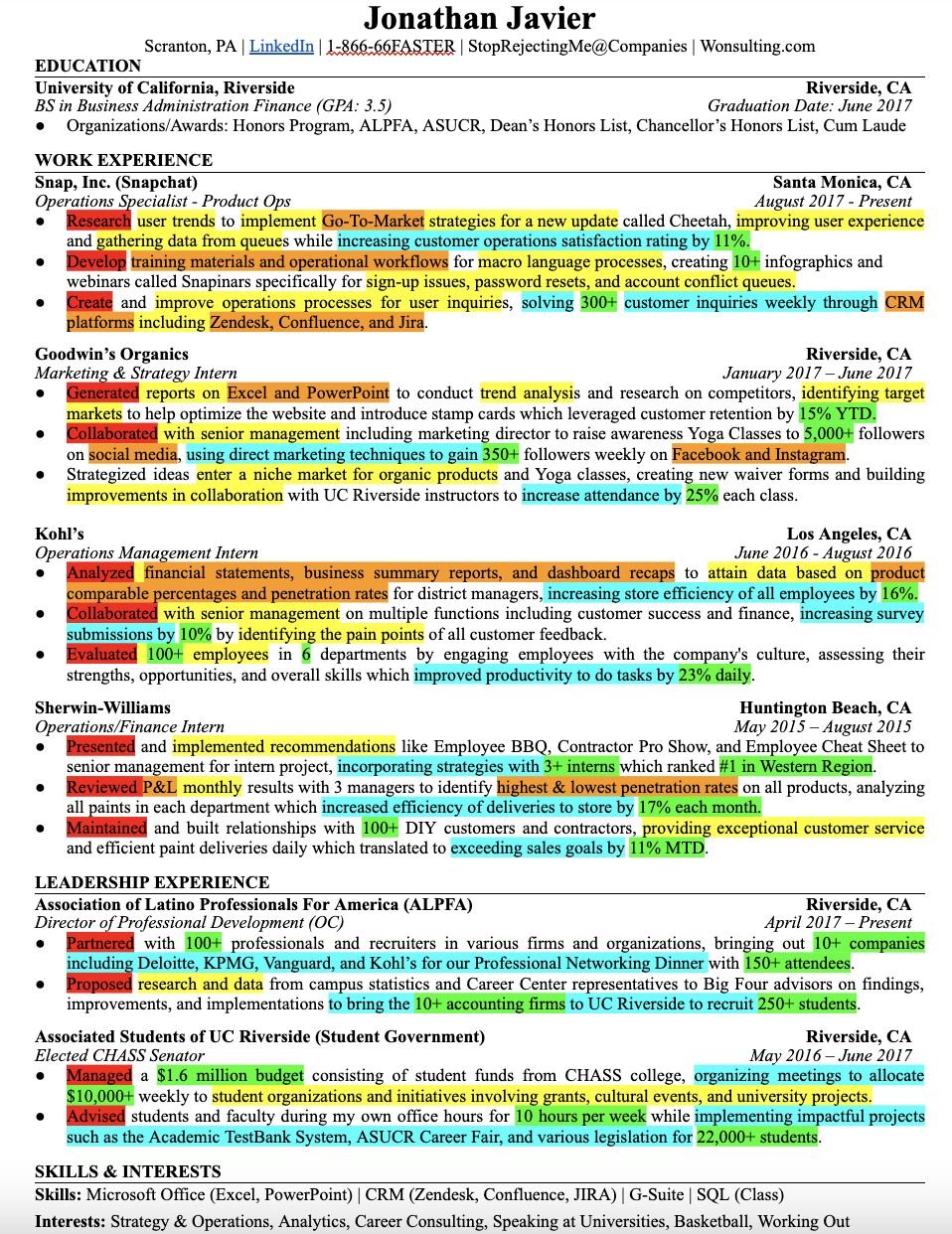Resumes for Media Companies
I worked in the entertainment industry for quite some time, and now I’ve been advising students and grads for about as long as that. I’ve collected some advice on resumes along the way that I wanted to share with you. As I wrote this, I realized how long this is and how much you need to know.
Please keep in mind that these tips often represent general industry thinking. At the end, you need to make your own choices, but in many cases, if you don’t follow these tips, folks may assume you aren’t familiar with industry practices. Please keep in mind that:
· These are my thoughts. It’s up to you if you want to follow them.
· This is for resumes for media companies and more for office-based work.
· These tips are for the resumes for students and recent graduates.
How you apply for a job tells people how you would likely do that job. Take care and be responsive.
Format
Most resumes include the following sections:
· Name/ address/ contact details
· Education: College/University (and usually not high school)
· Professional Experience
· Skills or Skills/Interests
· Awards (if relevant)
· Projects (if relevant)
· No need to mention references. That’s assumed, and they’re rarely asked for.
· No need for a headline.
General format tips:
· One page resume for early in your career.
· Send as a PDF unless asked not to.
· Your resume should always be a work in progress, but it is best to always be prepared with an updated version.
· The document name is your name and RESUME.
· No typos. One mistake and you may be done.
· People like clean, short, and straight to the point resumes that are read left to right.
· Most prefer one column. Multiple columned or boxed text can make finding applicant info harder for them.
· People want to see a resume that is easy to read and helps us learn about your qualifications without having to search for the information.
· Don’t be afraid to show some white space. Sometimes less is more!
· No pictures, please.
· Watch your format closely to ensure that you’re consistent with margins, fonts, punctuation…
· Margins should line up, and indentions should consistent throughout.
· Resumes serve to get you the interview, not the job.
· Text should be considered prime real estate. A cluttered resume fluffed just to look “experienced” can also hurt you.
· Consider printing off your resume to make sure it looks professional and organized.
· Remember, your resume is your first impression you give, and your resume gets you the interview! If your resume is carelessly done, they may think you are careless.
· Focus it on what YOU will bring to the company, not what the company will provide you.
· Clean up your social media before applying.
Information:
· Have a LinkedIn. List it. Recruiters often check those.
· Consider a non-school, conventional email address in case you lose access to yours after school ends.
· You don’t always need to list an address.
Education at the top:
· Education at the top early in your career.
· Only list a GPA if’s high (maybe 3.7 or higher).
· Do you have an online portfolio of your work? Provide a link on your resume for us so we can see examples of what you have accomplished but ONLY if it’s relevant to the job you’re applying for.
· Consider keywords in your resume. Recruiters may filter resumes by a keyword search and then they focus on those applications that have those terms. In many companies, a recruiter is not the actual hiring manager and might not know the position as well. They generally have buzz words we want to see that relate to skills or known entities. They may also do searches for those keywords, and you won’t come up if you don’t have them. Software can be such as search. Also, let’s take a “Film Production” job as an example. You’d want to cite words that are related, loud and clear, such as:
o Editing
o Pre-Production
o Post-Production
o Storyboard
o Final Cut Pro
o Adobe Premiere or Avid
Then Experience:
· Do not include high school experience if you have any college experience. A goal early on is to push high school work off your resume.
· Utilize 3-5 bullet points on your resume when sharing each item of your experience.
· Begin these statements with an action verb like managed, organized or selected for. Avoid using “responsible for” instead focus on what you uniquely contributed.
· Keep each statement simply, strong, powerful, and specific. Typically, no more than 10-15 words. The convention is to not use “I” in a resume. So it’s not “I edited...” It’s “Edited…”
· Student films may not help much unless you’re listing specific types of work you did or they were remarkable in some way (known filmmakers, cast etc).
· Where you can, include numbers to tell your story! For example: Editing 200 videos. Top views 500,000.
· Credentialize companies and their work. People may not have heard of where you worked. How big are they? Any major clients or credits?
· Name dropping helps: There might be an amazing internship with an unknown company (especially for getting experience), but ultimately names folks know help.
· Promotions and longevity are huge, especially with students. If you were promoted or have several roles under one company name, you look superior and desirable.
· General, non-film experience can be key. Have you answered/rolled phone calls, have desk experience, inventory, customer service experience? Experience rolling calls, for example, can be key for work at a busy office. They want people they hire to do that. Such work can also shape a narrative for you.
· Volunteer work can be key as well. It can also shape a narrative about you.
· Some places are very open to accomplished people from other areas of study or life experience. Don’t be afraid to use your success stories. I had one student who trained in ballet for years and was very light in film experience. I told her to include the dance, and she effectively used that to network. Her dance experience showed her character. Being very accomplished in something impresses a lot of people. She was quickly hired at a studio. One friend of mine got her start because she ran marathons. That caught a recruiter’s eye, and she thought it showed that my friend had discipline. She’s now the executive producer of an internationally known television show.
Then Skills/Interests:
· Make sure to include a skills section where you list any technical skills or programs you know, including social media platforms.
· List your software and (if relevant) hardware skills. List the specific programs. Are you experienced with computer software? This is particularly key is any items that were listed in the job description.
· Do you speak another language? That’s a skill.
· Personally, I like to list some interests. I think they can he helpful for shaping a narrative and catching someone’s eye. I was hired for a key early job because I listed the Chicago Cubs as an interest. After I hired, the film producer said he liked that as he was a baseball fan. He also liked that I was a Cubs fan (who at that point hadn’t won for 80 years) because it meant I knew how to suffer – a key ability for indie film work.
· Being very accomplished in something impresses a lot of people.
Finding the Internship
· Applying to companies should be a full-time job if you are serious. Most people I’ve met apply to a few and wait or take the process slow and usually don’t find success (I’ve seen). Being aggressive and busy often makes the difference.
· Connections and referrals can be key. If you feel like you don’t have many, time to find networking groups (not hard in entertainment/media).
· Appling can be a full-time job.
Applying
· Track various companies on LinkedIn, Facebook, Instagram, and Twitter.
· Research places and people.
· If you don’t care about an application, that often shows. How good of an employee will places think you are if you don’t care when applying? How you apply is an indication of the job you’d do.
· Don't apply to 5 different positions at the same column unless they're related. One recruiter stopped an interview after the applicant said that he's interested in pursuing a career which was totally different from the intern position he was interviewing for.
· Save emails or texts with any interactions for later. You can recontact people later, especially if you have an update. That’s networking.
· A personal referral for a position can be critical, however. That often takes the form of someone emailing someone there and letting them know someone applied. That’s flagging someone. Recruiters often appreciate such tips. However, be careful with these. If someone doesn’t apply well, they may not take another referral from you. At times, companies ask you if you have one. Seek one out if you can. If you know someone there, just let them know you’re applying. They may offer.
· Stay in touch with people you interview with. You may interview with them again.
· Apply quickly for listed positions. At smaller companies, it’s often people with other work who just wanted to hire someone and move on. At larger companies, people often fill positions as applicants apply.
· If you want to go the extra mile, find a recruiter at the company you’re applying for on LinkedIn and try to connect. Be polite and note that you’re applying. Only contact a relevant recruiter, one hiring in the area you’re applying to.
· Correspond quickly and professionally. If offered, take it. There are many other candidates for positions. They may quickly offer it to someone else.
· If are from an underrepresented community, a priority for some studios, should they point that out in their cover or resume? A recruiter at a major media company advised me this: “Not directly. But they should definitely list student and professional organizations they are involved in that will help the recruiter identify they are a person of color or from an underrepresented group. Or once in the interview, it never hurts to offer up your background in a way that ties into their motivations and aspirations. Example: "Growing up in a Latino household, I was always taught from a young age the importance of a strong work ethic..." This helps the recruiter identify them as a diverse candidate and could help them get the job if they hit all the other requirements/ qualifications. Languages spoken can as well, as can your information on LinkedIn.
· Don’t stop yourself from applying. There’s plenty of people around to say no. Don’t say that to yourself before you apply.
· I strongly suggest you take the job on offering or very soon after. On more than one occasion, I had a student ask to think about it only to find the offer was then pulled.
Don’t worry if you don’t feel ready to apply. Few do!
Below are some samples from the Fox Resume Guide, an older but still very handy guide. I also included a sample from Linkedin from the gentlemen listed at the top.





